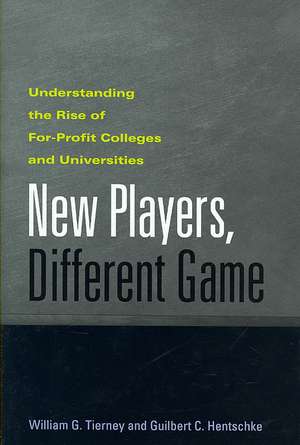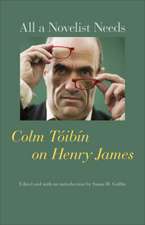New Players, Different Game – Understanding the Rise of For–Profit Colleges and Universities
Autor William G Tierney, Guilbert C Hentschkeen Limba Engleză Hardback – 11 oct 2007
For-profit institutions offer a fundamentally distinct type of postsecondary education. Some critics argue the institutions are so different they should not be accepted as an integral part of the American higher education system. Here, Tierney and Hentschke explore what traditional and nontraditional colleges and universities can learn from each other, comparing how they recruit students, employ faculty, and organize instructional programs. The authors suggest that, rather than continuing their standoff, the two sectors could mutually benefit from examining each other's culture, practices, and outcomes.
--Marc Tucker, President, National Center on Education and the Economy
Preț: 337.63 lei
Nou
Puncte Express: 506
Preț estimativ în valută:
64.61€ • 69.09$ • 53.87£
64.61€ • 69.09$ • 53.87£
Carte tipărită la comandă
Livrare economică 17 aprilie-01 mai
Preluare comenzi: 021 569.72.76
Specificații
ISBN-13: 9780801886577
ISBN-10: 0801886570
Pagini: 208
Ilustrații: 15 b&w illustrations
Dimensiuni: 140 x 223 x 21 mm
Greutate: 0.4 kg
Ediția:New.
Editura: Johns Hopkins University Press
Locul publicării:Baltimore, United States
ISBN-10: 0801886570
Pagini: 208
Ilustrații: 15 b&w illustrations
Dimensiuni: 140 x 223 x 21 mm
Greutate: 0.4 kg
Ediția:New.
Editura: Johns Hopkins University Press
Locul publicării:Baltimore, United States
Notă biografică
William G. Tierney is University Professor, Wilbur-Kieffer Professor of Higher Education, and director of the Center for Higher Education Policy Analysis in the Rossier School of Education, University of Southern California. He is the editor of The Responsive University: Restructuring for High Performance and Competing Conceptions of Academic Governance: Negotiating the Perfect Storm, both published by Johns Hopkins.
Descriere
The authors suggest that, rather than continuing their standoff, the two sectors could mutually benefit from examining each other's culture, practices, and outcomes.



